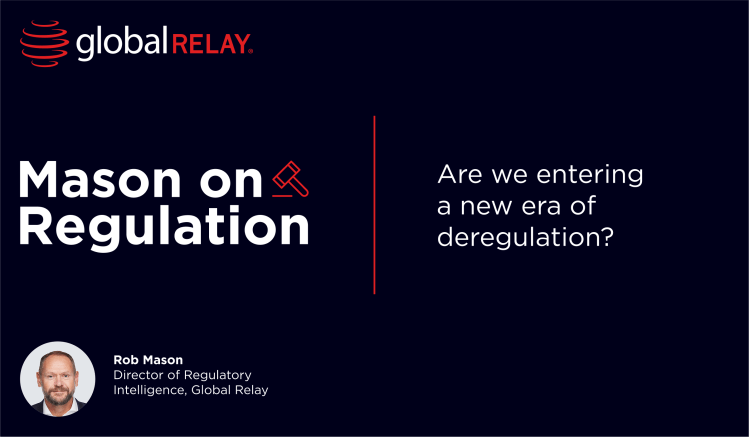
Are we entering a new era of deregulation?
With regulators shifting focus away from enforcement and emphasizing the benefits of self-reporting early, are we entering a period of deregulation in financial services – and what does this mean for firms?
Written by a human
The last few months have been interesting times for those of us working in regulatory intelligence (although I would argue that times are always interesting in this space). We’ve seen a growing pace of change from regulators in the U.S. and in the U.K. that is raising pressing questions around the history – and the future – of regulation in financial services. This includes a particularly important question: Should we rename this column “Mason on Deregulation?”
Reducing regulatory burdens – and then some
While the recent overturning of convictions for rate-rigging in the wake of the LIBOR scandal is the result of a decade-long self-contained legal battle, it is tricky not to see it as somewhat of an “end of an era.” Many of the regulatory standpoints and enforcement appetites we have taken as gospel for the last 17 years were a direct result of the LIBOR and FX collusion scandals, and the quashing of convictions that were seen by some as scapegoating individuals for failures of the system perhaps feel like part of a wider regulatory sea change.
Recent proposals by the Financial Conduct Authority (FCA) to “streamline” its Senior Managers & Certification Regime (SM&CR) feel like the tip of the deregulation iceberg. On the surface, these proposals will reduce the “regulatory burden” on firms (and, conveniently enough, the FCA) by reducing the amount of paperwork they must do to certify that senior managers are “fit and proper” to do their jobs.
However, with the regulator recently putting such a heavy emphasis on non-financial misconduct (NFM, and more on this later,) this proposal feels somewhat counterintuitive, and could risk undermining the checks and balances put in place to ensure good conduct and culture being enshrined at the top of firms. We know all too well what happens should misconduct at the top go unchallenged.
The scuffle around the FCA’s controversial proposal to “name and shame” firms under investigation as a deterrent also comes into play here. While the plan never became reality, the scale and ferocity of the pushback from the finance industry and U.K. government had the desired effect, putting the regulator in a position where a climbdown felt inevitable. Regulation is always a balancing act between the regulator and the regulated, and consultation periods are vitally important so legislation does not overextend.
The FCA has been dogged by enforcement backlogs and lengthy timescales for bringing cases to court, subject to an National Audit Office (NAO) review and scathing feedback by U.K government MPs and peers, and has been slow to deliver messaging to the markets. Combine this with under-resourcing despite its steadily increasing regulatory mandate, and its little wonder the regulator has frequently found itself caught between the rock of government expectations and the hard place of industry opinion.
Regulate? We’d rather cooperate …
Across the pond, we’ve seen an even more outward shift, since January saw a changing of the regulatory guard. Both the Securities and Exchange Commission (SEC) and the Department of Justice (DOJ) have gone to lengths to emphasize the benefits of self-referrals, disclosures, and proactive cooperation from firms.
The DOJ has made it abundantly clear that firms that discover an internal compliance failure and voluntarily disclose this to the Criminal Division, and perform “full cooperation, timely remediation” and avoid “aggravating circumstances” will avoid a Criminal Division Corporate Enforcement and Voluntary Self-Disclosure Policy (CEP) enforcement altogether. Matthew Galeotti, head of the DOJ’s criminal division, summarised:
“Self-disclosure is key to receiving the most generous benefits the Criminal Division can offer. Why? Because coming forward and coming clean lets the Department devote its resources to investigating and prosecuting individual wrongdoers and the most egregious criminal schemes.”
The SEC has similarly championed a move away from “regulation by enforcement” and a more “business friendly” approach that includes an open dialogue with the industry, especially on hot topics like AI and cryptocurrencies. We’ve seen similar rhetoric around “bridging the gap between market participants and the regulator” from the FCA.
Both the SEC and the Commodity Futures Trading Commission (CFTC) have emphasized the potential benefits firms might see from proactive self-reporting, cooperation, and remediation, and we’ve seen firms that issued a swift “mea culpa” and worked with regulators receive vastly reduced financial penalties – or, in some instances, no penalty at all. While more cynical members of the community may paint this as regulators expecting firms to do their job for them by self-policing, this shift is not without precedent.
The goalposts haven’t moved
While some may see the decreased appetite for enforcement actions and pivot towards self-referral and cooperation as a sign that they might be able to ‘relax’ some of their compliance efforts (and reduce budgets), they should not allow themselves to be lulled into a false sense of security. There is no sign that the benchmark for previously existing regulations has moved – in fact, quite the opposite.
While the pace of enforcement actions for off-channel communications may have slowed compared to their flat-out 2022/2023 heyday, they have by no means fallen off the regulatory radar entirely. In January, the SEC hit a dozen firms with a combined $63 million in off-channel communications fines, and since then, we’ve seen the Financial Industry Regulatory Authority (FINRA) hit both firms and individuals for off-channel communications breaches. The FCA’s recent issuing of the results of a survey into off-channel communications breaches at 11 wholesale banks is yet more proof that this is an area that regulators will continue to return to, and that expectations around recordkeeping and communications compliance remain high.
While the FCA’s proposed changes to the SM&CR might appear to some to be a lowering of expectations around individual conduct, they may be outweighed by the regulator’s doubling down on non-financial misconduct (NFM) rules. Committing to expanding NFM rules that currently apply to 37,000 regulated non-bank firms, the regulator is making it plain that firms need to do the work on “tone from the top,” and that misconduct of all kinds will not be tolerated. While we’ve seen very recent examples of financial misconduct met with a show of force from the FCA, it will be interesting to see if its stronger positioning on NFM results in enforcement action further down the road. Regardless, the FCA has set the bar here, and it’s vital that firms work to reach it.
Boom and bust
Several commentators have recently highlighted the “boom and bust” cycle that the financial space is seen to exhibit, and that periods of economic instability are often heralded by a shift toward deregulation. Whether that cycle is destined to repeat itself remains to be seen, but, to quote “The Voice of a Generation,” the times, they are a-changin’.
Questions are arising quickly during this period of change. Has public and market confidence in regulators like the FCA and the CFTC been eroded by debacles including “name and shame,” apparent hypocrisy over email retention, and enforcement officials misleading the courts? If U.S. regulators aren’t pursuing enforcement aggressively, will their U.K.-based counterparts feel a similar urge to take their foot off the gas? Is government pressure now having too much sway over supposedly independent regulation? Will deregulation kickstart economies? And at what cost?
Firms shouldn’t sit on their hands and wait while regulators figure it out. The regulatory benchmarks are the same as they ever were, and the expectations are clear – firms need to make sure they’re clearing them.



